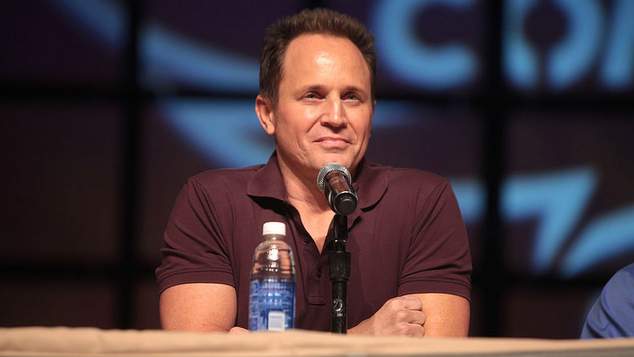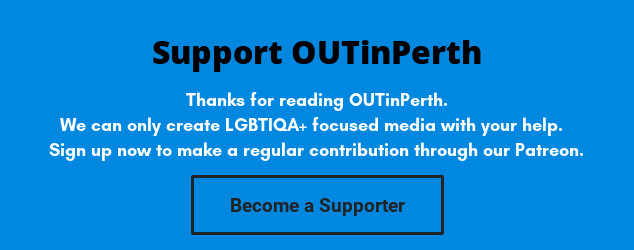
In 1993 the Mighty Morphin Power Rangers were launched upon the world and created a pop culture phenomenon that had pre-teens across the globe addicted on the daily.
For David Yost, the man inside the blue Power Ranger suit, keeping his sexuality a secret proved more constricting than his spandex onesie.
When Breaking Bad star Bryan Cranston who did voice over work on the show made an off the cuff remark about his displeasure about the blue ranger being named after him, Yost who had struggled with homophobia in Hollywood throughout his career, spoke up.
Clinton Little chatted to David Yost ahead of his appearance at Supernova
The Bryan Cranston thing… A lot of headlines were generated over Bryan Cranston’s 2009 comments about his discomfort with his surname being associated with your sexuality, (the Blue Ranger was named Billy Cranston),how did those remarks affect you personally and professionally?
When I first read it I was caught off guard and I was in shock. I’d never met Bryan Cranston and it was a little off putting. For someone I’d never met to jump to conclusions was a little offensive. A lot of the fans would come to his defence and say that he wasn’t talking about you; he was talking about your character and all kids of crazy things like that.
If that were the truth then one would have to assume then that Bryan Cranston sits around and watches episodes of power rangers and somehow came to the conclusion that my character was gay, which certainly was not the case. Basically he was making the comment because people behind the scenes, people that he worked with sat around and had a laugh at my expense based on rumours that I potentially might be gay.
Today he would be instantly vilified for such a statement, what was the climate like at the time he made those remarks, that he would have felt comfortable in doing so?
It wasn’t even that long ago, the comment was made in 2009; it wasn’t even the 90’s. He wasn’t vilified when it came about when I called him out on it and people came to his defence. They were telling me to grow up and I was just trying to make a point that I don’t support people who make homophobic comments.
He might have thought he was just saying something in jest, but there’s nothing funny about it because basically when someone said “oh it’s cool you have a power ranger named after you”, he said, “Yeah but he’s the Fey one, that’s the problem”. He’s basically saying it sucks though because he’s the gay guy.
Are you more comfortable speaking out now about the way you were treated back then in the wake of the “me too” movement?
I’ve always tried to toe the line and be diplomatic. I’m a part of a show that has become iconic over the last 25 years and I want the fans of the show to really focus on all the positive things that they got out of the show, and not on the stuff that goes on behind the scenes.
So I speak about it but I’m not walking around upset and angry. As a person I’m more comfortable talking about my sexuality and to talk about what happened to me.
I get letters every day via social media from people who tell me: “Thank you so much for coming out, you’ve given me the courage to come out, thank you for sharing your story”. “Those things have happened to me and you’ve given me confidence to stand up to people who are doing those things to me at my job and in my life”.
It’s all a reward for me on so many levels because I know that I’ve helped other people to find the strength within themselves to speak up and talk. I’m glad the “me too” movement has happened for women, it was long overdue.
My story is similar to some of what they had to go through. I’m glad these things are coming about because hopefully it’s only going to make the world a better more accepting place.
When you left the show it’s been reported that you tried conversion therapy to change your sexuality, how long did you go through that process before you accepted yourself?
Well the conversion therapy I had done that quite religiously for two years which unfortunately caused a nervous breakdown because I was actively working against the truth of who I was and mentally I couldn’t take it anymore.
After my nervous breakdown it took me years to be comfortable and really be open about myself. It wasn’t an overnight process and it took a long time to be happy and comfortable.
The Power Rangers was appointment viewing for pre-teens in the 90’s, what was it like to be in the midst of an institution like that? Did you feel it at the time or was it not until later?
It’s hard to be a part of what is a “phenomenon” it’s hard to take it all in, it’s sort of mind boggling. At the time I didn’t really take it all in, I didn’t quite understand what was going on.
For me I was just going to work at my job that I enjoyed doing as an actor, I enjoyed doing all of that, but the phenomenon on a world level I didn’t quite grasp until now, where I’ve realised this really was a huge hit and our characters had such an influence on people’s lives. They still praise the show and just show us love every day and it’s really amazing.
You stay connected with fans on social media like Twitter? Are the interactions mostly positive or negative?
I would have to say 98% positive, there are those few people that like to jump in and say stupid stuff, and it doesn’t faze me. Either their comment is edited or they get blocked.
Usually I will try and send a private message to the person, saying I’m sorry you feel this way and try and air my opinion. By doing that I would say that 90% of the time the person will apologise to me and say “I was having a bad day” or “I have social issues and sometimes I just lash out”.
It’s a great lesson for me because the people that are being negative are actually going through a lot of stuff themselves. For whatever reason that’s why they’re reacting to me but as soon as I’m nice to them that I have a little bit of compassion for what they are going through it changes their outlook.
You also starred in the play Fallen Guardian Angels about six different people dealing with HIV/AIDS, how was the experience of playing that role both personally and professionally?
It’s always amazing to play a character who has to deal with issues of life and death, the character I played, his partner died of HIV. Going through all of that, watching your partner get sick, listening to your partner’s last breath, as an actor it was amazing and it’s still such an important play to put on because so many people still struggle with HIV/AIDS.
We have medications that have slowed to process to a halt and people are living amazing lives now and I’m really thankful as an actor to play a character like that.
Do you still fit into the original blue Power Rangers suit?
I don’t know where the original blue suit is but right now where I am physically yes; I’m pretty close to my Power Rangers original weight!
David Yost will be appearing at the Supanova conference June 22 to the 24th, tickets and details at their website.
Clinton Little, Image by Gage Skidmore from Peoria, AZ, United States of America – David Yost, CC BY-SA 2.0, Link





